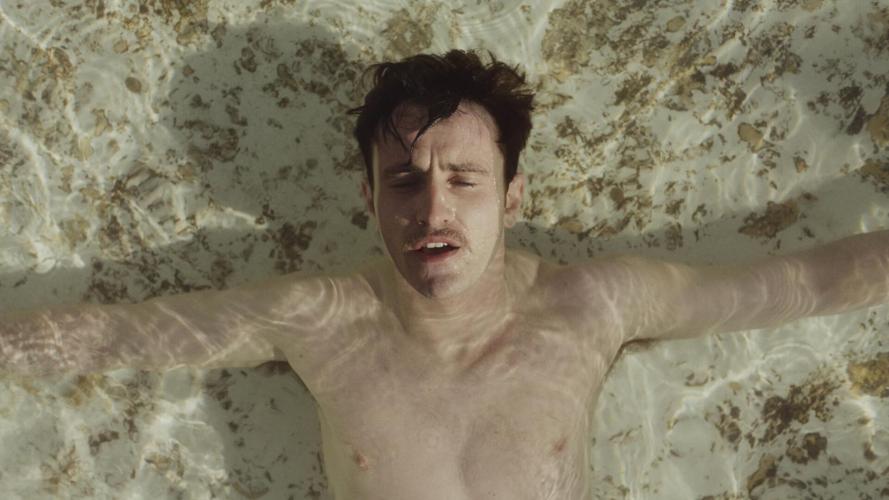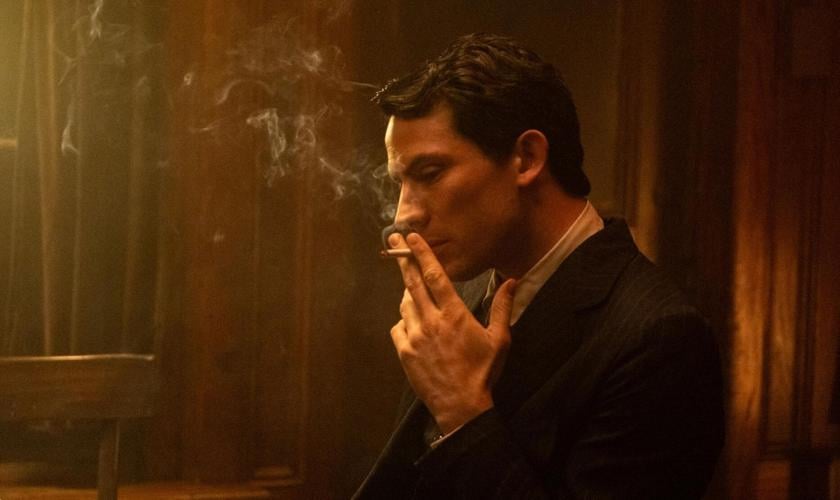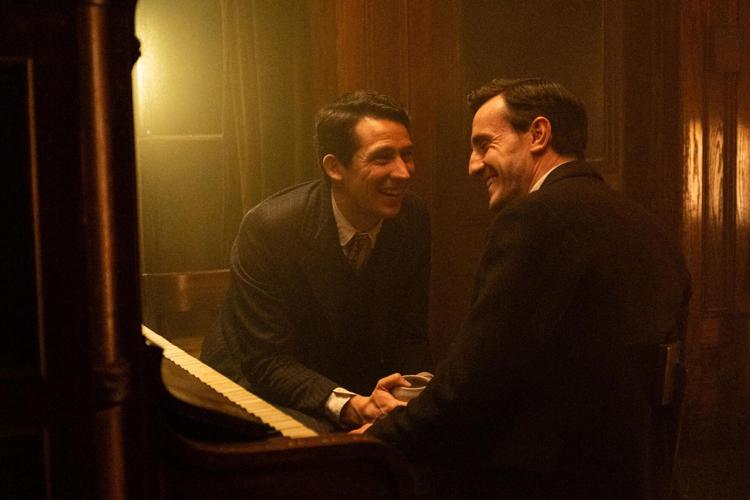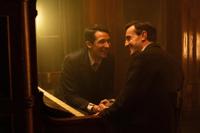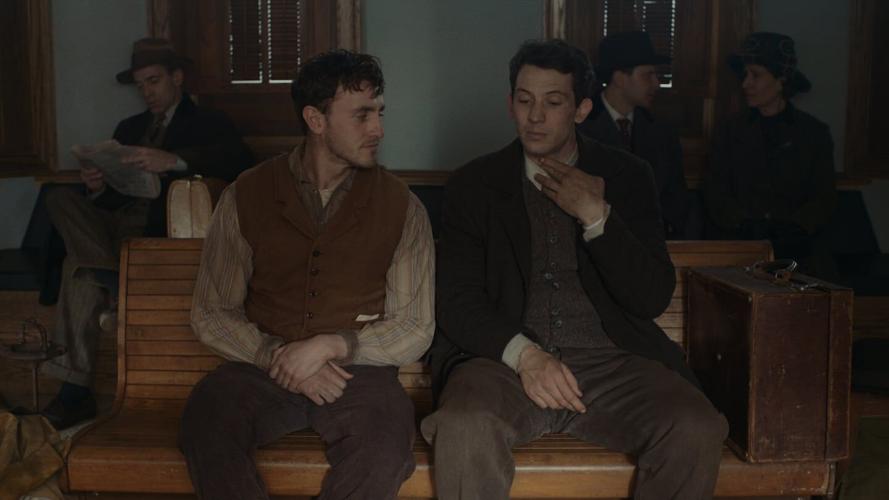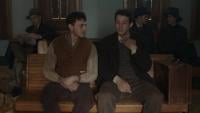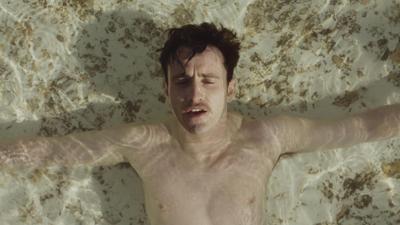Paul Mescal is probably most known now for his role in the recent blockbuster sequel, Gladiator II (2024). He was nominated for an Emmy Award for his part in the series Normal People (2020), but he was up for an Oscar for the independent film Aftersun (2022). He's done quite a few independent films since making a name for himself five years ago. Another notable film was All of Us Strangers (2023), which was about a sad and lonely, gay man, dealing with the loss of someone close to him. In that case, it was his parents. This film, directed by Oliver Hermanus, could be a kind of spiritual prequel to that film. Written by Ben Shattuck, this film is also about a sad and lonely, gay man, dealing with the loss of someone close to him. Mescal stars as Lionel Worthing, a college student at the Boston Conservatory, during the time of World War I. He's an aspiring singer who grew up on an apple farm in Kentucky. He has no siblings and eventually both his parents pass away. He becomes alone in the world and he has no interest in maintaining his family farm. Things change for him when he meets and falls in love with another college student.
As the film began, what came to mind are titles under the banner of Merchant Ivory Productions. Ismail Merchant, an Indian film producer, joined forces with James Ivory, a film director from the Pacific northwest. The two became business partners and also romantic interests for one another. Merchant-Ivory films were typically, lavish, Edwardian period pieces often focusing on tragic romantic situations. As Hermanus' film began, I thought of Merchant-Ivory's Oscar-nominated Maurice (1987), which is also about a gay romance between two college students in the time just before World War I. Hermanus' film isn't as lush and lavish. This is probably due to the fact that most of the film isn't set inside the college. It's mainly set alongside Lionel as he treks from one place to another, often by walking through woods, dirtying himself along the way. The film isn't grimy, as it's more naturalistic in its depiction. We even see Lionel camping here and there, which is probably why early critics compared it to Ang Lee's Brokeback Mountain (2005).

Josh O'Connor is an Emmy winner for his role of Prince Charles in The Crown (2016). He also recently made a splash in Luca Guadagnino's Challengers (2024). Here, he plays David White, the aforementioned college student with whom Lionel falls in love. David is a piano player who first impresses Lionel when he somehow is able to play the song that Lionel's father used to sing. They bond over it, which quickly leads to them spending the night together. They are able to spend some time enjoying one another, but their romance is quickly interrupted with David getting drafted into WWI and Lionel eventually graduating from the conservatory. However, David comes up with an idea that he and Lionel should take a walking trip through David's home of Maine. David wanted to take a gramophone with him and record the folk songs from various people around the state.
They hike together through the woods to various communities, rural communities, trying to accumulate folk music. It takes them days and days to traverse the entire state. In the evenings, they set up camp sites with a tent. When the two are cuddled in their shared space, yes, it can give flashbacks to Brokeback Mountain. However, this section of the film is notably brief. There's a tender moment when Lionel explains how a gramophone works and provides a beautiful metaphor for sound itself, but their trek through Maine really passes rather quickly. There's a section where Lionel and David go to Malaga Island, which is in the Gulf of Maine. That island has some contentious, racial history, which the film hints, but rather brushes over. The film gives actor Dion Graham, playing one of the Malaga Island residents, a moment to shine and speak his truth, but the film doesn't do much with this nod to real-life history in terms of what their music means and how they've learned or passed it along.

It becomes obvious that the film isn't necessarily concerned with the musicology. The folk songs and their presence here are instead just a crutch that the film barely utilizes. It's more concerned with Lionel's loneliness and his dissatisfaction with his life. He had what he believed is his happiest moment and what could have been the true love of his life with David. He chose to let it go or not pursue it. His reason for that choice likely derived from what might be general homophobia. Unlike Brokeback Mountain, Hermanus' film doesn't actually depict any homophobia. It's implied. It's presumably homophobia that keeps Lionel from pursuing anything with David. This haunts Lionel and the haunting is the major force underpinning the narrative. I'm not sure that haunting is interesting in its depiction of how it affects Lionel's relationships with both young men and women after David, but it does seem to be the through-line here.
It's ironic that O'Connor is in this film after having just been in that Guadagnino flick because during a brief sequence, Hermanus' story feels like another Guadagnino feature, that of Call Me By Your Name (2017). That Oscar-winning film was written by James Ivory. It was set in Italy, and during that aforementioned sequence, this film also goes to Italy. That sequence is also too brief, but it underscores the Merchant-Ivory nature here. As I watched, I was also reminded of BBC's Man in an Orange Shirt (2017), which is broadly about a same-sex male romance set in the early 20th century, particularly because there is a plot point in that BBC series and here involving letters written between the two men that reveal their romance in a crucial moment. Mescal is heartbreaking in that crucial moment and most moments throughout the film. Hermanus manages to continually frame him in beautiful fashion, whether it's beefcake shots or tender close-ups of his soulful face.

That might not have been enough to make this film compelling in any way, but there is a section of the film that did hit me like a gut punch. It's perhaps emotionally manipulative. This so-called section features Lionel hearing something on a gramophone. The performances managed to move me. It was a well done moment that made the journey getting there feel worth it.
Rated R for some sexuality.
Running Time: 2 hrs. and 8 mins.
In theaters.

